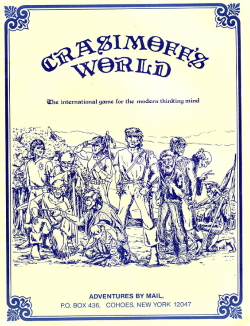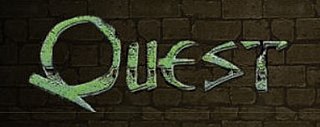Related Research Articles

A play-by-mail game is a game played through postal mail, email or other digital media. Correspondence chess and Go were among the first PBM games. Diplomacy has been played by mail since 1963, introducing a multi-player aspect to PBM games. Flying Buffalo Inc. pioneered the first commercially available PBM game in 1970. A small number of PBM companies followed in the 1970s, with an explosion of hundreds of startup PBM companies in the 1980s at the peak of PBM gaming popularity, many of them small hobby companies—more than 90 percent of which eventually folded. A number of independent PBM magazines also started in the 1980s, including The Nuts & Bolts of PBM, Gaming Universal, Paper Mayhem and Flagship. These magazines eventually went out of print, replaced in the 21st century by the online PBM journal Suspense and Decision.
Starweb is a closed-end, space-based, play-by-mail (PBM) game. First published by Flying Buffalo Inc. in 1976, it was the company's second PBM game after Nuclear Destruction, the game that started the PBM industry in 1970. Players today can choose a postal mail or email format. Fifteen players per game assume one of six available roles and explore and conquer planets within a universe comprising 225 worlds. The object of the game is to attain a predetermined number of points which are generated by various actions during gameplay. Multiple game variants are available. Starweb is still available for play as of 2021 through the company Rick Loomis PBM Games.

Legends is a turn-based, role-playing game with a medieval setting. It is currently published in English by Harlequin Games. Jim Landes—owner of Midnight Games, the game's first publisher—began developing the game in 1984, eventually publishing it in December 1989 as a play-by-mail (PBM) game after over a year of playtesting. The initial game comprised a module and game system built on the publisher's existing game, Epic, and was run briefly as Swords of Pelarn before publication as Legends. The first of multiple game modules was Crown of Avalon, which allowed up to 200 players per game. Demand by 1991 was "incredible" according to Bruce R. Daniel in White Wolf. Games could be lengthy, initially between three and ten years of play, settling into an average of three years by 2002.

Hyborian War is a play-by-mail game published by Reality Simulations, Inc. It takes place during the Hyborian Age in the world of Conan the Barbarian created by Robert E. Howard. The game has been continuously available for worldwide play since its inception in 1985 and has changed little in its overall format. It uses a computer program to adjudicate player orders. Although it relies on postal mail or email and has turnaround times which are relatively long for the digital age of video games, Hyborian War has remained active into the 21st century.
Paper Mayhem is an out-of-print play-by-mail (PBM) game magazine that was published in Ottawa, Illinois. The staff published the initial issue in July 1983 and the magazine ran until mid-1998. Its format was 40 pages published six times per year. The magazine was the most well-known of the play-by-mail periodicals of the period, providing articles and reviews of play-by-mail games, as well as reader-informed ratings of play-by-mail companies, game masters (GMs) and games, both intermittently and on an annual basis. The magazine, along with its long-time editor-in-chief, David Webber, was influential in the play-by-mail community, even echoing into 21st century play-by-mail activities. The publication ceased suddenly in mid-1998 following the unexpected death of Webber.
CTF 2187 is a closed-end, computer-moderated, play-by-mail (PBM) game that was published by Advanced Gaming Enterprises in the 1980s. It involved teams of robots, of varying size and capabilities, battling on a hex-grid arena with the purpose of defeating the opposing team or their command post. Players assumed the role of a battle robot pilot. The game was tactically-focused, with combat action beginning on the first turn. Games lasted 5–10 turns, or about six months. Players began at the rank of cadet but could spend experience points earned from a completed game to increase in rank for future games, up to the rank of General.

Crasimoff's World is a play-by-mail (PBM) game that was first developed by Kevin Cropper in 1980. It is regarded as the first fantasy role-playing PBM game.
Fall of Rome is a play-by-mail strategy wargame that was published by Enlightened Age Entertainment. Set in the period after Roman times, it involved covert action and combat. The game won the Origins Award for Best Play-By-Mail Game of 2004.
Lords of the Earth (LOTE) is a play-by-email game, first published by Thomas Harlan in 1983 during a growing era of PBM games. Initially played by postal mail, the game featured mixed moderation—computer moderated with some human assistance. By 2002, the publisher processed turns by email (PBeM). Lords of the Earth comprises multiple campaigns, each one a separate game. Campaign 1 is the oldest, set in the mid-1800s in the "Age of Air and Steam". Other campaigns begin from 2000 BCE to 1400 CE. Settings were global in scale, with one campaign featuring an outer space setting.
TribeNet is an open-ended, medieval fantasy, play-by-email (PBEM) game. It was first published in the mid-1980s in Australia as a hand-moderated play-by-mail (PBM) game. After multiple gamemaster changes in the 1990s, Peter Rzechorzek took over as gamemaster in 1997, at which point the game transitioned from postal mail to email. Since its inception, the game expanded from the initial continent available for gameplay, adding additional continents such as Cyberia and Pelagoria.

Victory! The Battle for Europe is a closed-end, military strategy, play-by-mail (PBM) wargame. The game was first published by Rolling Thunder Games, Inc. in 1991 after a period of initial growth in the PBM industry. The game centers on Europe while including parts of North Africa, the Middle East, the United States, and Canada. Forty players start each game with equal resources among countries, although geography causes differences between starting positions. Games last for about three years each. The game received positive reviews and rankings in the PBM magazine Paper Mayhem in the 1990s, including tying for second place in its Best PBM Game of 1995 list.

Quest is an open-end, fantasy, play-by-mail (PBM) role-playing game. Initially released in the United Kingdom in 1991, by Adventures by Mail, it later became available for play in the United States, Australia, and other countries in Europe. The game has a First and Second Age, initially comprising about twenty worlds of up to 1,000 parties controlled by players. After the year 2000, the worlds consolidated into four. The current publisher is KJC Games.
KJC Games is a gaming company that publishes play-by-mail (PBM) games. Kevin Cropper started the company in 1981. It published PBM games such as Crasimoff's World, Earthwood, and It's a Crime.
Terra II is a open-ended, play-by-mail (PBM) wargame published by Clemens & Associates.
Epic is a computer-moderated, fantasy play-by-mail (PBM) game.
Dawn of the Ancients is a closed-ended, computer moderated, play-by-mail (PBM) wargame. It was published by Game Systems Inc., in August 1984 as its second offering after Earthwood. In 1988, KJC Games began offering the game in the United Kingdom.
Earthwood is a closed-ended, computer moderated, play-by-mail (PBM) fantasy wargame.
Warlord is a closed-ended, computer moderated, play-by-mail (PBM) wargame.
Austerlitz is a closed-ended, computer moderated, play-by-email (PBM) wargame. It is published by Supersonic Games.
References
- 1 2 3 Morris 2001. p. 22.
- 1 2 3 4 5 Wasden 2000. p. 4.
- 1 2 Editors 2001. p. 7.
- ↑ Editors 2001. p. 39.
- ↑ Wasden 2000. p. 7.
- ↑ Morris 2001. p. 23.
- ↑ Lomas 2001. p. 24.